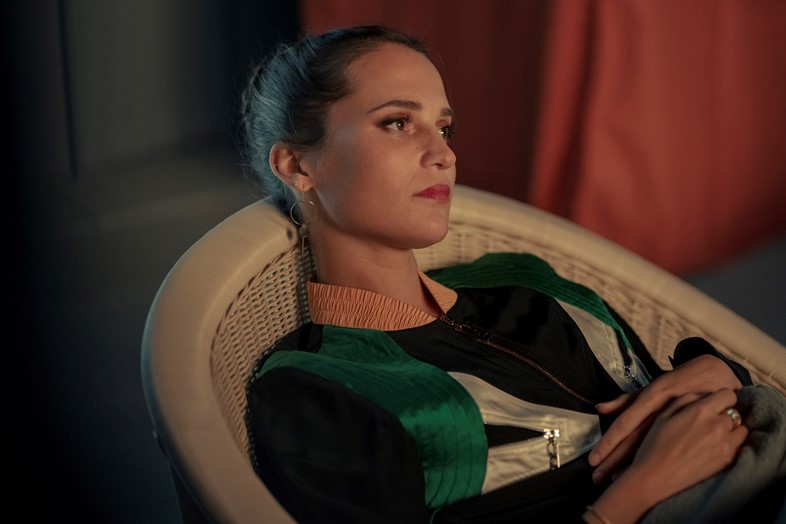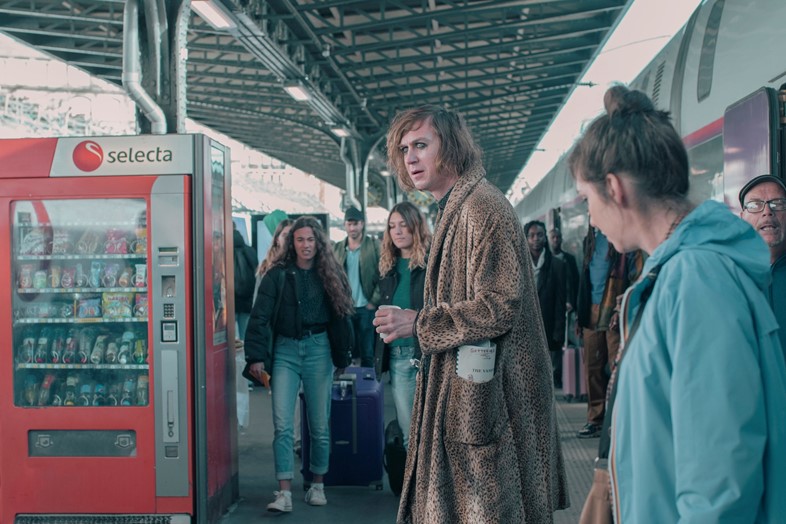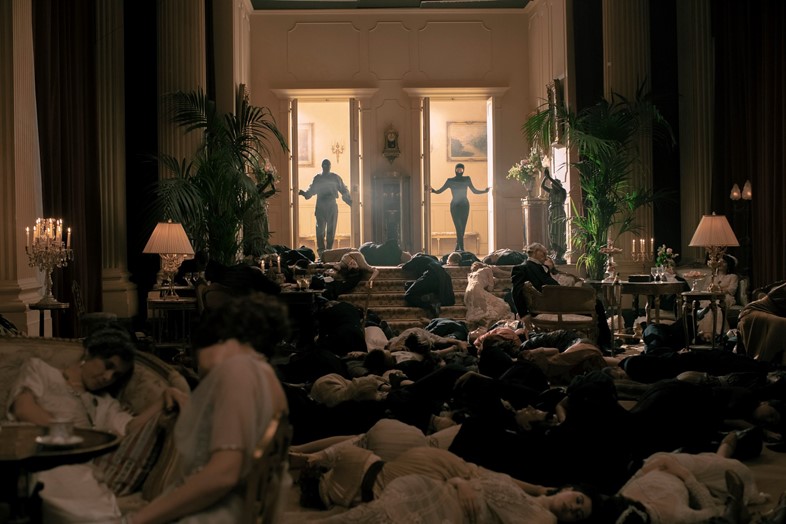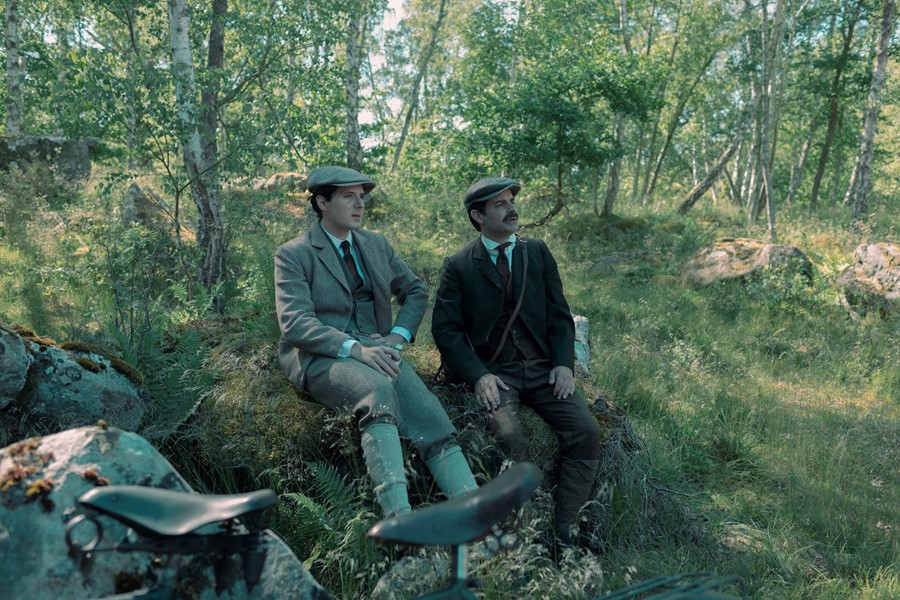As the new mini-series arrives on HBO, French filmmaker Olivier Assayas discusses the state of contemporary cinema and enlisting Alicia Vikander as his lead
In many ways, Olivier Assayas never moved past his first calling. The French filmmaker began his career as a critic for the revered film magazine Cahiers du Cinéma, refining both his critical taste and bone-deep adoration for the form. Assayas’s films have a remarkable clarity to them, crafted with a critic’s searching eye. He has always experimented with different genres and fields – from Personal Shopper’s elliptical ghost story to Demonlover’s far-sighted take on virtual reality gaming – and the passage of time has typically rewarded him. His arresting 1995 film Irma Vep pre-empted the folly of remakes, portraying a chaotic production contemporising Louis Feuillade’s 1915 silent serial Les Vampires while simultaneously damning the then-state of French cinema. He parachuted in a luminous Maggie Cheung, playing herself, as a contrast to the French film industry’s more staid tastes; she was, as Assayas himself notes, “a Polaroid of the energy of Hong Kong [cinema] at that time.”
With HBO’s Irma Vep, an eight-part expansion of the original film, Assayas is having his cake and eating it. The new series folds in Assayas’s personal connection to Irma Vep (he and Cheung were married between 1998 and 2001), adjusts the focus to Hollywood’s present-day failings and enlists Alicia Vikander as Mira, an A-lister fleeing to France to liberate herself from blockbuster filmmaking. It is a rewardingly dense, delicately layered treat, at once esoteric and universal, and steeped in Assayas’s great reverence for cinema and its infinite potential.
Here, Assayas speaks with AnOther about why he returned to Irma Vep, the series’ Proustian nature, and why David Hockney is “the greatest theoretician of cinema.”

Patrick Sproull: In 2019, you said that you were ’militantly’ against watching your old movies again – what changed and how did that pave the way for the Irma Vep series?
Olivier Assayas: Irma Vep comes from many different sources. It was all there when I made the first one in the 90s, but then I felt like there was much left to be said. I did that film with so little money on such a small scale and it was just on a whim. I had the space before I started shooting a bigger film – wrote it in nine days, shot it in four weeks – I hardly had the time to absorb whatever was going on, then the film was out there all of a sudden. It was not my most successful film – I would not rate it in those terms – but it’s certainly the one that touched a nerve and made my filmmaking international. The thing is that the original Irma Vep, in similar ways as the longer version, is also a portrait of my own weird take on movies and what they are, how they are made and why they are made.
”The thing is that the original Irma Vep, in similar ways as the longer version, is also a portrait of my own weird take on movies and what they are, how they are made and why they are made” – Olivier Assayas
PS: You once said that you very rarely have a preconceived idea of your projects and with this obviously being a remake, your first series since 2010’s Carlos, as well as drawing on your personal life, what was it like going into Irma Vep again?
OA: This was a textbook case. I had no idea where I was heading. When you start writing something that in the end will be seven hours, you just don’t know how you will drift, how you will navigate those waters. When I did Carlos a while back, I was relying on the chronology, I was relying on modern history in many ways and on the elements that were very well-documented. So, I kind of knew more or less how that was going to be constructed. In the case of Irma Vep, it could have gone in any possible direction. I had great partners – HBO, A24 – and they were really excited by the idea of giving me that kind of freedom and letting me use it as well as I could, and they were incredibly supportive. All the doors were open and things that would have seemed out of reach when I made the original film all of the sudden were possible. I could expand what I thought I only hinted at in the original one but, more or less, the big surprise for me is that I got dragged into it. This was not going to be about myself, it was not going to be an intimate project, it just became an intimate project on the way.

When I made the original film, it was how a modern filmmaker would translate Louis Feuillade’s work in modern terms. Here, there are more layers. One layer being the narrative of Musidora, who was the original actress, and her memoirs; her writing was not available when I made the film. I discovered them later because of my continuing interest in the work of [Louis] Feuillade. But I felt that that added something vital to the project and then I realised that looking back it’s been 25 years since I made Irma Vep. My own personal connection to this film became a layer in this story, meaning that was when I met Maggie Cheung and she became my wife … failed marriage, blah blah blah. All of a sudden, I was part of the story and it shed a light on something that has always been extremely important and meaningful for me which is the mix between reality and filmmaking. It was so interconnected it became even painful at moments when I started writing those scenes, and it’s really Musidora and the autobiographical thread that carried me, and in the end, [these] were the dynamics for the series.
PS: Was there a certain point when you realised that your personal circumstances with the original film were so crucial that they became an extension of Irma Vep and brought into the TV series?
OA: I think it happened in the writing. I’m not sure what the precise answer is but it must have been when I was working on the second or third episode. I keep on telling that in the series, but I do really believe that when you write you’re dealing with ghosts, and that specific ghost invited itself into the series. There was nothing I could do about it because it was something that was so obvious and essential.

PS: I read an interview with Alicia Vikander where she and the interviewer started to get confused about who they were talking about because in this world there’s Alicia’s Mira, Mira’s interpretation of Irma Vep, Maggie in the original film, Maggie’s interpretation of Irma Vep – there’s a lot of layers. Did the meta nature of the series ever confuse you?
OA: If you wanted to talk modern you can say it’s ‘meta’, if you use another perspective, you can also say it’s Proustian. I think it has to do with the layers of time. I think it’s a comedy, I think it’s meta, whatever, but I think it’s also about the layers of time and how they communicate with each other. How the present and the past have a dialogue, how you can be inspired to make something very modern by a work of art made a century ago. Yes, there is a lot of confusion between the layers of time but that’s what it’s all about, that’s what our own individualities are about. We are always lost within the layers of time – at least I am.
”The dialogue between the history of art and modern cinema is fascinating. For a while now I’ve been obsessed with the work of David Hockney, I think he’s the greatest theoretician of cinema” – Olivier Assayas
PS: In your films you’re incredibly fascinated by the artistic process – Demonlover was about gaming, Clouds of Sils Maria was about theatre, Non-Fiction was about literature and Irma Vep is about TV. What interests you in creating art about creating art?
OA: I think it mostly has to do about the fact that most movies are movies about filmmaking in the sense that a lot of filmmakers are inspired by cinema. I try to be mostly inspired by real life. I don’t try hard, it just happens, it comes naturally to me. I spend more time in real life than in movieland. I only spend a little part of my time in movieland. Reality is what obviously inspires me, but I think that maybe it’s my upbringing, the fact that I started as a painter and my artistic education was through the history of painting before being about the history of cinema. I’ve always been fascinated with the way films and cinema interconnect with other arts. My father was a writer, my mother was a fashion designer, they were both artists in their way, and they didn’t think much of cinema. My father wrote screenplays, but he didn’t think much of them. He loved telling stories but that was pretty much it. But I’m the opposite. The dialogue between the history of art and modern cinema is fascinating. For a while now I’ve been obsessed with the work of David Hockney, I think he’s the greatest theoretician of cinema. He doesn’t know it. I met him and I tried to have a conversation about cinema with him, and he didn’t really want to go in that direction. But I genuinely think that he understands movies better than most film writers and filmmakers.
PS: Was there any possibility of Alicia playing herself in the same way Maggie did in the original film?
OA: It would have made much less sense. At the time [of the original film] Hong Kong was one of the most energetic places to make movies. I have travelled to Hong Kong, I’ve spent time there and fed on this energy. I just wanted someone who could bring that modernity of Chinese filmmaking to the West and Maggie was the obvious choice. Today there’s not much left of whatever Hong Kong filmmaking has been. It’s been swallowed up by China in many ways. A lot of the friends I have in Hong Kong or Taiwan, they’ve moved to mainland China and are making movies there because that’s where the money and audience is, and Hong Kong filmmaking has become marginalised. It wouldn’t have made sense to use another Hong Kong actress to play Maggie because Maggie was a Polaroid of the energy of Hong Kong at that time. Obviously, I liked the idea of using Maggie for what she was. Maggie in Irma Vep is a very specific character and she’s pretty unique.
I think Alicia is a very different character in the same way that Mira is a very different character from Maggie in the sense. It’s enough to say that she embodies the conflict of an actress today who on the one side is attracted by the mainstream potential of modern Hollywood filmmaking, and on the other wants to try and live up to whatever she had dreamed filmmaking should be about. With a lot of the blockbuster movies, there’s little space for the actors, and it’s not that much fun to make because it’s all green screens and wires. Alicia did Tomb Raider and it was like a 100-day shoot for one feature. I think she liked the idea to have freedom and she’s typical of American actors or actresses, meaning the best, meaning the most talented. They do the expensive Hollywood movies but ultimately, they know that what attracted them to acting was not exactly that. It was also the potential to be creative to do something that’s not scripted, to try things and go in this or that direction depending on your instinct. That was the basis of my collaboration with Kristen Stewart and I think it’s very similar to what I experienced with Alicia but no, we did not use Alicia as a character.
Irma Vep is streaming now on HBO.
